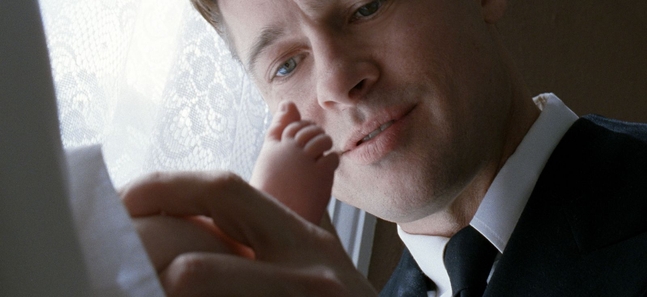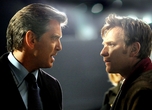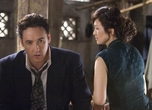
Brad Pitt is surprised to find his latest baby in the mail. From 'The Tree of Life', copyright Fox Searchlight Pictures
Posted: Tue May 24 2011
Director: Terrence Malick
Starring: Sean Penn, Brad Pitt, Kari Matchett
Time Out rating: 
There’s so much brilliance at work in The Tree of Life, the new film from Terrence Malick, and the film’s ambition and willingness to lay itself open to interpretation are hard to fault. But it’s also difficult not to conclude that this hugely anticipated film from American cinema’s lesser-spotted poet of man and nature is a work that stretches itself so broadly by asking the Big Questions that it ends up dealing in platitudes.
Still, The Tree of Life offers breathtaking imagery and even manages to survive an epic detour to the dawn of time, featuring the Big Bang, dinosaurs, meteors and all. It’s so ambitious and full of inquiring ideas and questions about our place in the world that, perhaps inevitably, it feels like a grand folly – albeit a heartfelt and stimulating one. Such is the chaos of life, the universe and everything, maybe that’s even the only appropriate outcome of such a project?
Here, the director of Badlands, Days of Heaven and The Thin Red Line takes his previous interests to a more universal plane. You could say the film is set in the 1950s as it portrays, in poetic and fragmentary detail, the life of a family: a mother (Jessica Chastain), father (Brad Pitt) and three young sons, one of whom they lose as a teenager. Early on, the mother’s voiceover sets up a debate, asking whether man should follow the more selfish way of nature or the less selfish way of grace, and she and her husband seemingly embody both approaches. She is a loving presence, photographed in the context of trees, birds and butterflies; he is a businessman, prone to anger and tells his sons, ‘If you want to succeed, you can’t be too good.’
Time is fluid even in this section: It’s more poetic than real. But from here, the film takes an extraordinary leap. We go back millions of years, to the beginning of the world and a long section, complete with choral music, that stands as a staggeringly crafted hymn to creation. We see swirling gases, planets emerging and the beginning of life itself, which leads to plants, fish and dinosaurs. It suggests we should see the family of the rest of the film as an archetype, a typical family in Biblical terms even, and certainly not of any particular time.
And yet, instead of looking back from the family to the context of pre-history, you could also look back to it from our point in time. You could see this family’s story as an origin tale for modern America. Malick prompts such a view by giving us one of the sons, played by Sean Penn, a few scenes set in the present. Penn is seen, mostly alone, in a vague business context in a shiny, modern city, but also in more dreamlike scenes, wandering in the desert, and finally in the film’s heavenly final scene, gathering on a beach with a crowd of characters, including his own family from the 1950s. It’s the final scene that will tip the film into an uncomfortable place for some. Here, it feels overtly religious and even Christian (rather than just interested in the spiritual) as the sound of ‘Amen’ wails repeatedly from the soundtrack.
If it sounds like a swirl of images and ideas, suggestions and juxtapositions, that’s exactly what The Tree of Life is. Taken alone, the film’s imagery should give great pleasure to Malick’s fans and newcomers alike. Leaving aside the novelty of the magically rendered pre-history scenes, the 1950s episodes look gorgeous. The elemental, crisp photography, making even suburbia look like a place of great nature, is incredibly alluring.
And yet for all the grand ideas and the sweep of history at its core, the film does feel repetitive and even simplistic. It’s not so crude as to portray Pitt’s character as demonic or evil, but its portrayal of Chastain’s character as an angel of the Earth does begin to feel shallow, and the ritual loss of innocence that the sons go through also feels laboured. It’s a film that fascinates as much as it frustrates. Its saving grace, though, is that The Tree of Life always feels honest and never cynical. It feels both relevant to us and personal to the filmmaker. It doesn’t always communicate well, and when it does, it’s sometimes trite, but it’s also a film that’s incredibly beautiful and wide open for the taking.
The Tree of Life opens in Japan on August 12
Tweets
- About Us |
- Work for Time Out |
- Send us info |
- Advertising |
- Mobile edition |
- Terms & Conditions |
- Privacy policy |
- Contact Us
Copyright © 2014 Time Out Tokyo














Add your comment